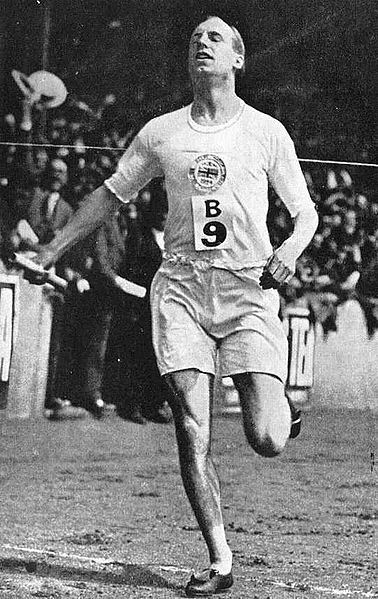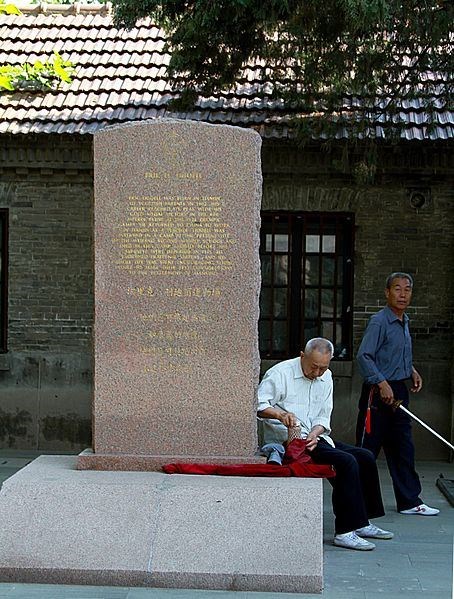“Many of us are missing something in life because we are after the second best.” - Eric Liddell
 Eric Liddell at the British Empire versus United States of America (Relays) meet held at Stamford Bridge, London on Sat 19 July 1924unknown (Sports event handout)[1] [Public domain]Would you give up your only chance to win a gold medal at the Olympics and bring glory to your country just because of personal beliefs? A normal person wouldn’t think twice about competing, but Eric Liddell was by no means a normal person. Eric Liddell was a Scottish rugby player and sprinter who excelled in the 100-meter and 200-meter dash. In 1924 he was given the opportunity to represent his country at the Olympic games in Paris. As he was boarding the boat to go to France, Liddell was given the schedule for the games. Upon reading his event was to take place on a Sunday, he opted to run the 400 the day after instead of the 100 as it was against his belief to play games on the Lord’s day. Since Liddell had no experience running the 400-meter dash the whole stadium was surprised when he took the gold medal. After winning Scotland a gold medal, Liddell moved to China to minister to the people (Eric). All heroes must possess two important qualities: a caring heart and a legacy. Their actions must be for a purpose higher than themselves. Eric Liddell is truly a hero because he is caring and is remembered for his actions at the 1924 Olympics and his missionary work in China.
Eric Liddell at the British Empire versus United States of America (Relays) meet held at Stamford Bridge, London on Sat 19 July 1924unknown (Sports event handout)[1] [Public domain]Would you give up your only chance to win a gold medal at the Olympics and bring glory to your country just because of personal beliefs? A normal person wouldn’t think twice about competing, but Eric Liddell was by no means a normal person. Eric Liddell was a Scottish rugby player and sprinter who excelled in the 100-meter and 200-meter dash. In 1924 he was given the opportunity to represent his country at the Olympic games in Paris. As he was boarding the boat to go to France, Liddell was given the schedule for the games. Upon reading his event was to take place on a Sunday, he opted to run the 400 the day after instead of the 100 as it was against his belief to play games on the Lord’s day. Since Liddell had no experience running the 400-meter dash the whole stadium was surprised when he took the gold medal. After winning Scotland a gold medal, Liddell moved to China to minister to the people (Eric). All heroes must possess two important qualities: a caring heart and a legacy. Their actions must be for a purpose higher than themselves. Eric Liddell is truly a hero because he is caring and is remembered for his actions at the 1924 Olympics and his missionary work in China.
The first quality that must be present in a hero is a will to help others. What Eric Liddell did after being captured by the Japanese and placed into a POW camp is remarkable. “As he always had, Eric threw himself heart and soul into his work and volunteer activities. He taught in the camp school; organized softball, basketball, cricket, and tennis games. He organized square dances and played chess with the kids- anything to keep them out of trouble.” (Metaxas) Eric Liddell is caring because even through the misery of the POW camp he was still trying to help others. He devoted himself to restoring the happiness of the kids that were stripped of their childhood and stuck in the prison camp. His kindness does not stop there. According to the Gale Database, “During the course of the war, British prime minister Winston Churchill arranged to have Liddell released from the camp, but Liddell turned the offer down. Instead, he allowed a pregnant woman to take his place.” (Eric) Here, Liddell shows his caring heart by giving up his opportunity to leave the POW camp to release someone he didn't even know. Later, Liddell died due to a brain tumor. Had he not given up his spot he would have lived to see his wife and kids. Based on the evidence Eric Liddell clearly dedicated his life to helping others.
 Monument of Eric Liddell in Weifang, ChinaRolfmueller [CC BY-SA 3.0 (https://creativecommons.org/licenses/by-sa/3.0)]Another quality a hero must possess is a long-lasting legacy. Liddel had precisely this. Summing up Eric’s life Metaxas writes, “ So Liddel is remembered today for one reason. He was willing to make an almost impossible sacrifice: not only the greatest prize in sports but also the chance to bring honor to his beloved country-not to mention fame, fortune, and glory to himself.”(Metaxas) Few remember any of the other athletes at the 1924 Olympics but many books and movies have been made on Eric Liddell. We remember Liddell not just for the races he won but the lives he saved through his sacrifice. Liddell inspired many through his life. Talking about Liddell's death Alcorn says, “Upon learning of Eric’s death, it wasn’t just Scotland that mourned. All over the world people who had been inspired by him in the Olympics and in the Christian life joined the mourning.”(Alcorn) These statements demonstrate Liddell's widespread impact on mankind. His memory is imprinted in everyone who hears his story. Based on the evidence it can be concluded that Eric Liddell is remembered for his actions.
Monument of Eric Liddell in Weifang, ChinaRolfmueller [CC BY-SA 3.0 (https://creativecommons.org/licenses/by-sa/3.0)]Another quality a hero must possess is a long-lasting legacy. Liddel had precisely this. Summing up Eric’s life Metaxas writes, “ So Liddel is remembered today for one reason. He was willing to make an almost impossible sacrifice: not only the greatest prize in sports but also the chance to bring honor to his beloved country-not to mention fame, fortune, and glory to himself.”(Metaxas) Few remember any of the other athletes at the 1924 Olympics but many books and movies have been made on Eric Liddell. We remember Liddell not just for the races he won but the lives he saved through his sacrifice. Liddell inspired many through his life. Talking about Liddell's death Alcorn says, “Upon learning of Eric’s death, it wasn’t just Scotland that mourned. All over the world people who had been inspired by him in the Olympics and in the Christian life joined the mourning.”(Alcorn) These statements demonstrate Liddell's widespread impact on mankind. His memory is imprinted in everyone who hears his story. Based on the evidence it can be concluded that Eric Liddell is remembered for his actions.
In conclusion, Eric Liddell is a true hero for his caring heart and long-lasting legacy. After winning the 1924 Olympics he went to China to minister to the people, getting captured in the process. Long after he has passed away, he is remembered not because he won the gold medal but for the sacrifices he made. He is an inspiration to me because he stood for his belief and was rewarded for that. Being a track runner myself, I understand how rewarding it is to win a race. Giving up a race for a belief seems unfathomable let alone in the Olympics; carrying not only your hopes but the looming pressure of your entire country. Eric Liddell sets an example for the rest of humanity. Should we all choose to follow in his footsteps and care for one another with all our heart, the world would be a much better place.
Works Consulted
Alcorn, Randy. “The Little Known Story of Olympian Eric Liddell's Final Years - Blog.” Eternal Perspective Ministries, Eternal Perspective Ministries, 12 Feb. 2018, www.epm.org/blog/2018/Feb/12/olympian-eric-liddell.
“Biography.” Eric Liddell Centre, Eric Liddel Centre, www.ericliddell.org/about-us/eric-liddell/biography/.
"Eric Liddell." Gale Biography in Context, Gale, 2016. Biography In Context, https://link.galegroup.com/apps/doc/K1650010424/BIC?u=powa9245&sid=BIC&xid=978cfd62. Accessed 3 May 2019.
Metaxas, Eric. Seven Men - and the Secret of Their Greatness. Thomas Nelson Publishers, 2016.
Page created on 5/8/2019 4:14:09 PM
Last edited 12/9/2024 3:40:35 PM
